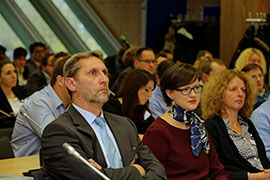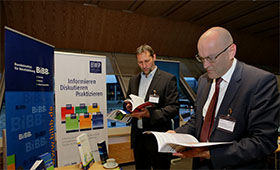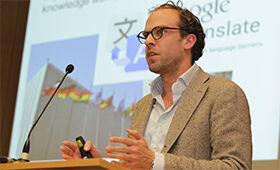“We need to take the people with us!”
Special conference at BIBB looks specifically at the occupational changes caused by digitalisation
Digitalisation is leaving its mark on sectors, occupational profiles and skills requirements. How deeply is it affecting company business and production processes? To what extent are the structures of tasks and jobs changing? And what about the human element in all of this? The above questions were a subject of debate for around 200 experts attending a special two-day conference held at the Federal Institute for Vocational Education and Training (BIBB) in Bonn and entitled “Vocational education and training – automation, digitalisation and polarisation”. The prevailing opinion which emerged from the presentations and workshops was that digitalisation mainly offered opportunities. BIBB President Professor Friedrich Hubert Esser also stressed that the challenges could be overcome: “But we need to take the people with us!”
The first day of the conference focused on fundamental issues related to the topic and on possible social implications. The keynote address was given by the economist and Oxford Professor Carl Benedikt Frey, who in 2013 had attracted attention with a joint study carried out with the engineer Michael Osborne on the likelihood of the robotisation of the American labour market. In Bonn, Professor Frey emphasised that human creativity, social intelligence and perception of objects remained irreplaceable, despite fears of impacts on employment in an age of bits and bytes.
The “polarisation thesis” put forward by Frey and Osborne states that ongoing automation in capitalist societies does not lead to a general higher level of qualification for all workers. The result is much more of a division into a small proportion of highly qualified staff with specialist technical knowledge on the one hand and a larger group of workers who remain unqualified on the other.
As was presented by BIBB researchers, the polarisation thesis does not strictly apply in Germany. Results have shown that the proportions of low-skilled and highly qualified employees are only rising at the expense of those with vocational qualifications in a very small section of the German economy. Fundamentally, the number of persons with academic qualifications will do up, and the number of vocationally qualified and low-skilled workers will fall. Increased cognitive requirements will then ensure that education becomes more important across all stages of life.

On the second day of the conference, four workshops held in parallel provided a detailed opportunity for participants to familiarise themselves with further BIBB research results. Preliminary investigations into dual IT core occupations revealed, for example, that the contents of the training regulations need to be updated. Secondly, a BIBB project conducted jointly with Volkswagen AG showed that the activity profile drawn up for a skilled worker in automated maintenance did not correspond to any training occupation and that clarification needed to take place as to how a supply of young skilled workers can be secured in future.
A third workshop provided information on the findings that had emerged from a BIBB research project on the use of digital media. These make it possible to describe the media competence of company-based training staff via a model. The aim now is for this model to serve as a basis for developing continuing training concepts for training staff. The topic addressed in workshop was the extent to which digitalisation was exerting an effect in the construction sector and in commercial occupations in particular.

The event concluded with a podium discussion on digitalisation and vocational education and training. Representatives from academic research, a major automotive group and an employers’ association all felt that the focus needed to be on the consequences that needed to be drawn as a result of the upheavals caused by digitalisation. more detailed IT training for vocational school teaching staff, particular motivation for employees and digital studies as a compulsory subject in schools were just some of the ideas to be put forward.
The presentations and discussions were supplemented by an exhibition of items relating to the topic of digitalisation. The special conference formed part of “Skilled worker qualifications and competences for the digitalised work of the future”, a joint initiative by the Federal Ministry of Education and Research (BMBF) and BIBB.

